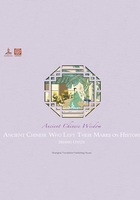
王勃 Wáng Bó (649-676 AD)
Brief Life, Lasting Fame
Wang Bo was one of the best-known poets during the early years of the prosperous Tang Dynasty (618-907 AD).
Wang was a prodigy who began to write when he was only six and by the age of 14, his poems and prose had already won wide acclaim among the intelligentsia. He passed the provincial civil examination when he was still a teenager and became the youngest official in the imperial court before reaching the age of 20.
Wang wrote many poems that have been relished since his time. One of the most read is about seeing off one of his close friends, titled “Seeing Off Vice-Prefect Du on the Occasion of His Appointment to the State of Shu.”
The poem describes the melancholy feelings of the two friends that had to part. But Wang expressed his confidence in their close friendship, which, he believed, would never suffer from the long distance that separated them. And the most palatable lines of the poem read like this:
“If one has a bosom friend in this world, it makes far ends of the Earth like next door neighbors.”
Even today, these lines are widely quoted to imply unwavering friendship among people who live far away from each other.
Besides his poems, Wang had won a matchless reputation for authoring the “Preface to the Pavilion of Prince Teng.”
The Pavilion of Prince Teng was first built in 653 AD and renovated 22 years later. After the renovation, the governor of Hongzhou (today’s Nanchang, capital of Jiangxi Province), where the building was located, decided to throw a big banquet for his friends and local scholars.
Actually, the governor had two purposes for the party: one was to celebrate the completion of the renovation and the other was to show off his son-in-law’s talent as a prose writer.
Therefore, at the party, the governor invited the guest scholars to write a preface for the pavilion. But due to the fact that most guests knew the host’s hidden intention, they all tried to be self-effacing by saying that they were not good enough to be the author of the preface for such a grandiose and imposing architecture.

Wang Bo was the youngest scholar attending the party. Seeing no one wanted to write the preface, he came forward and began to write the article in front of all the others.
The host was upset by the immodesty of the young man, so he left the party and went to sit in a guest room. But, he asked servants to timely pass the sentences written by Wang to him.
When he read the first two sentences, the host snorted: “Just so-so.” Then, when the next two sentences were presented to him, he nodded quietly. When he read the sentences describing the scene as “the sunset glow and the tame duck flying side by side, as the autumn river water and the long sky merge into one color,” the host applauded loudly: “This boy is a real genius! His fame will last for many generations to come.”
Wang’s article about the pavilion has not only found its way into today’s student textbooks, it has also made the building a household name in the country.
But unfortunately, the gifted poet’s life was cut short when he drowned at sea in an accident at the age of 27.